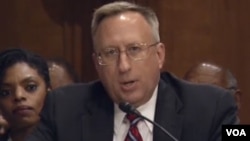The United States said Saturday it will not send a delegation to preliminary Syrian peace talks next week in the Kazakh capital, Astana, and will instead send a leading diplomatic observer.
Citing demands of the U.S. presidential transition, the State Department said U.S. Ambassador to Kazakhstan George Krol will attend the talks, which were organized without U.S. input by Syrian ally Russia, as well as Turkey and Iran.
Syrian President Bashar al-Assad has said his government is ready to "discuss everything" at the talks, which begin Monday, while rebel factions say they will limit their focus to enforcement of an ongoing truce and humanitarian issues. Rebels have also made it clear they will not yet enter into negotiations on a political solution to the crisis.
Further complicating peace efforts, the dominant al-Qaida-linked militancy Fatah al-Sham, which will not participate in the talks, called them a "conspiracy." A jihadist statement Saturday equated attendance by rebel groups at the talks to acknowledging the legitimacy of the Assad government, which rebels have battled to oust since 2011.
Earlier this week, Fatah al-Sham turned on another powerful Islamist group, Ahrar al-Sham, in Idlib province. That attack came after merger talks between the militant organizations failed.
Bomb blast rips Syrian refugee camp
In other developments, monitors from the Syrian Observatory for Human Rights say a car bomb struck a Syrian refugee camp Saturday near the Jordanian border, killing at least six people and wounding more than a dozen others.
A local activist told the observatory the blast came from a small truck carrying blankets, and said the explosion was detonated by remote control.
The Rukban camp, home to tens of thousands of refugees as well as some opposition fighters, is located in a remote desert area near territory held by Islamic State extremists.
An IS attack in October targeted a checkpoint at the sprawling camp, killing three people. Separately, six Jordanian border guards were killed nearby in July.
VOA State Department correspondent Steve Herman contributed to this report.






